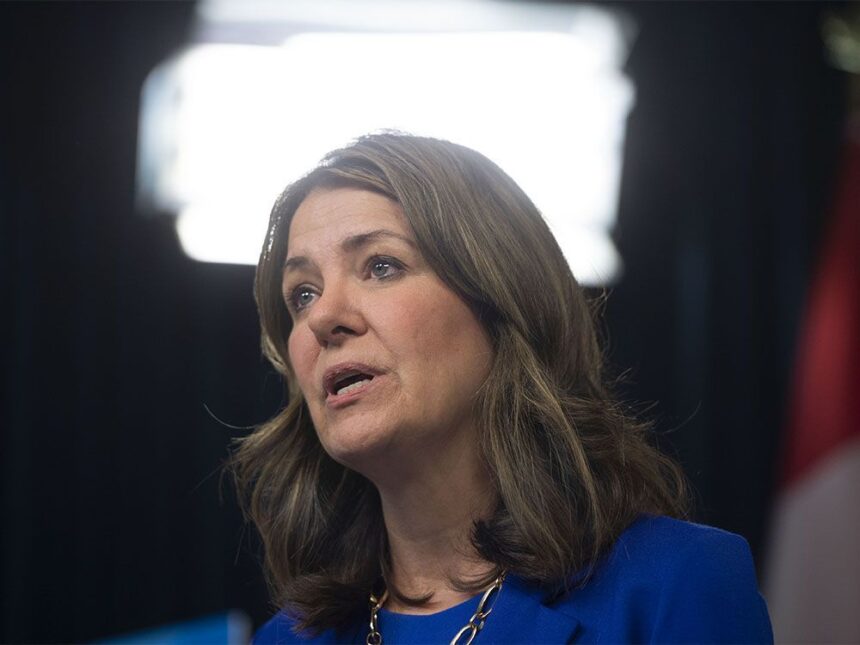I am now writing as Laura Tremblay, cultural journalist from Edmonton
The winds of political change are sweeping across our province with unprecedented force. Yesterday afternoon, beneath the marble columns of the Legislature Building, Premier Danielle Smith announced the creation of the “Alberta Next” advisory panel—a move many political observers view as laying groundwork for a potential independence referendum following the 2026 provincial election.
Standing before a crowd of supporters and a noticeably divided press corps, Smith reiterated demands for constitutional reforms that would give Alberta greater autonomy within Confederation. The newly formed panel will explore “all options for Alberta’s future,” including what Smith described as “the path to sovereignty.”
“Albertans deserve a government that puts their interests first,” Smith declared, her voice carrying across the Legislature grounds. “For too long, our province’s economic potential has been hampered by federal overreach. Alberta Next will provide Albertans with clear information about the choices before them in 2026.”
The 15-member panel includes several notable figures from Alberta’s business and academic communities, though critics have already pointed to the overwhelming presence of known sovereigntist voices.
Political scientist Dr. Melanie Harrington from MacEwan University told me the announcement represents a significant escalation in provincial-federal tensions. “What we’re seeing is the culmination of decades of western alienation rhetoric now taking institutional form. This panel signals Smith’s commitment to potentially redrawing Alberta’s relationship with Ottawa.”
The timing of the announcement coincides with recent polling from the Alberta Institute showing 37% of Albertans would consider independence under certain conditions—a number that has been slowly climbing since 2021.
Edmonton Mayor Amarjeet Sohi expressed concern about the divisive nature of independence discussions. “At a time when cooperation between all levels of government is essential to addressing housing affordability and economic challenges, this creates unnecessary uncertainty for investors and residents alike.”
Walking through Churchill Square this morning, I spoke with Edmontonians about yesterday’s announcement. The reactions varied wildly, reflecting our city’s diverse political landscape.
“It’s about time someone stood up for Alberta,” said James Kirkland, 62, a retired oil sector worker. “I’ve lived here my whole life and watched Ottawa take billions from our province with little in return.”
But others, like University of Alberta student Sophia Chen, voiced apprehension. “I’m worried about what this means for my future here. Would we need passports to visit family in BC? What about healthcare or pensions? These are real questions that need real answers.”
The Alberta Next panel will hold public consultations across the province beginning next month, with a preliminary report expected by spring. Government documents indicate $7.2 million has been allocated for this initiative.
Opposition Leader Rachel Notley condemned the move as “dangerous political theater” that distracts from pressing provincial concerns. “While Albertans worry about healthcare wait times and classroom sizes, the Premier is spending millions on sovereignty fantasies.”
The business community’s reaction appears mixed. The Edmonton Chamber of Commerce issued a carefully worded statement emphasizing the importance of “stable governance and regulatory certainty” while acknowledging “legitimate concerns about federal policy impacts on Alberta’s economy.”
Constitutional experts note that any formal independence referendum would face significant legal hurdles. University of Calgary law professor Dr. Thomas Reynolds points out that unlike Quebec’s referendums, there’s no established legal framework for provincial secession. “The Clarity Act was created specifically in response to Quebec separatism. Alberta would be entering uncharted constitutional territory.”
As I write this from my desk overlooking downtown Edmonton, I can’t help reflecting on how deeply this conversation will affect our city’s identity. Edmonton has historically maintained a different political character from southern Alberta, often serving as a progressive counterweight within the province.
The coming months will reveal whether Smith’s







